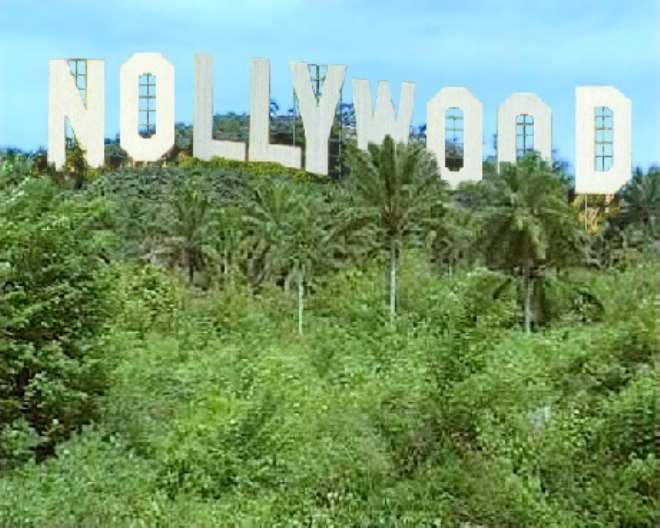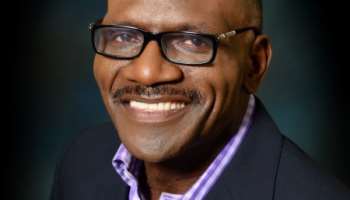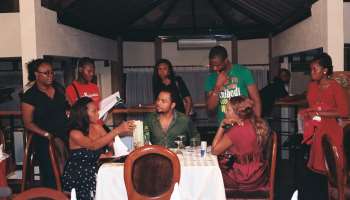Nollywood: Nigerian film industry explodes in growth
You've probably heard of Bollywood.
But have you heard of Nollywood?
Unless you're a film aficionado, I'll bet your answer is no.
And I'll bet you didn't know Edmonton is home to one of a very few of the world's Nollywood experts, either.
Onookome Okome is a professor in the University of Alberta's English and film studies department. His obsession? Nigerian cinema — a.k.a. Nollywood, a word combining Nigeria and Hollywood.
“Nollywood is cinema that evolved from the particular circumstances of Nigeria and became a distinct form of popular expression from the mid-1980s onwards,” Okome explains to me in a recent interview.
Nollywood is the fastest-growing film industry in the world, and one of the largest, too, in terms of output, alongside Bollywood and Hollywood. Nigeria produces a staggering 2,500 films a year, Okome tells me, and they're the most popular movies in all of Africa.
How do Nigerians make so many movies? Cheaply, that's how; we're talking production budgets of $10,000, $20,000, $50,000 tops. Compare this with, say, James Cameron's Avatar, which cost $500 million — nearly double the annual revenue of the entire Nollywood industry.
Nigerian movies aren't made in studios, let alone high-tech animation rooms. And this is a digital industry; unlike Bollywood and Hollywood, which make feature films for theatrical release, the majority of Nollywood movies go straight to video for home viewing. Which is why you've probably never seen a Nollywood flick showing at an Edmonton multiplex.
Nollywood got its start in the late 1970s, when there was a vacuum in Nigerian outdoor cinema culture — and by outdoor, I mean outside the safety of your house. Nigeria had just been through civil war.
The nation's cities were riddled with crime and violence, and going to the cinema was a potentially life-threatening night out. People wanted entertainment. But they wanted safe entertainment. “That was a big selling point,” Okome says.
Generally, Nollywood films tell fictional, simple stories set in the city of Lagos, chronicling struggles of common people: Nigerians eager to get rich — at any cost; Nigerians torn between the big city, with its tempting if amoral promises of wealth and anonymity, and the traditions of rural life; strong Nigerian women fighting for independence.
Initially, Nollywood was a grass-roots way of documenting social events, Okome says, reflecting hot-button issues in society, like television. But as technology evolved and grew more affordable, Nollywood exploded. Despite the cheap budgets, its quality is improving from its rudimentary, home-video-style beginnings. “The scripting is getting better, the actors are getting better,” Okome says.
At first, Nollywood movies were in local languages like Ibo, Edo and Urhobo. Living in Bondage (1992), a Nollywood classic credited with kick-starting the industry, was made in Ibo but later dubbed into English. As the industry grew, movies were made in Pidgin, a broken English that Nigerians with different mother languages use to communicate. And that has made the films accessible to all of Africa.
Nollywood's popularity in Nigeria outstrips that of pictures made abroad. In Lagos, it costs 350 naira ($2.40 Cdn) to get a Nollywood movie. But the demand for North American flicks is lower: a bootlegged Hollywood film costs as little as 200 naira ($1.34 Cdn).
“It means Nollywood films are still making it despite the influx from Hollywood, Bollywood and continental Europe,” Okome says.
You can get Nollywood films in Edmonton — Kasoa Tropical Food Market on 118th Avenue and 93rd Street is one place that rents and sells them. Maybe you've heard of some. Glamour Girls? Battle of Musanga? Osufia in London? OK, maybe you haven't. Me neither.
I couldn't find any big Nollywood hits in the public library's collection, so I borrowed Living in Bondage 1 & 2 from Okome to get a taste of the genre. The film is Mephistophelian, post-colonial and a butt-crushingly long haul — I'm talking more than four hours.
I won't lie and say I found the film entertaining (we're talking retro soap opera in desperate need of editing, complete with elevator-style music). I won't lie and say I watched the whole thing. But Living in Bondage was certainly intriguing — the same sort of intriguing that goes with travelling, and experiencing different cultures, religions, traditions.
Nollywood movies do speak to Okome, who came to Canada from his native Nigeria eight years ago. He enjoys Hollywood movies but has to suspend his critical attitude when he watches them. Though Hollywood is superior, in terms of quality, it tends to have flimsy messages that anyone can “get,” he says. Nollywood excels at delivering a meaningful message, but it's less likely to resonate with a non-African crowd.
Still, I remain extremely curious about this genre. And I'm not alone. More and more people in the West are gravitating to Nollywood — as a source of entertainment, and a source of study. Okome, whose next book about Nollywood comes out this year, uses the genre in his English lectures as an example of alternative forms of literature.
Nollywood, he says, is a testament to Nigeria's vibrant cultural entrepreneurship. “It's an industry financed by poor people, and it's completely in control of itself,” he said, adding that he loves that “the industry changed how the society looks at itself.”
In other words, Nollywood has, thanks greatly to cheap digital equipment, empowered Nigerians to tell, and watch, their own stories, rather than having Hollywood, the kingpin in the biz, do it for them.
Latest News
-
 "If You're For Me, I Am For You" - Cubana Chief P
"If You're For Me, I Am For You" - Cubana Chief P -
 "3 Days To Go" - Femi Adebayo Urges Fans To Get S
"3 Days To Go" - Femi Adebayo Urges Fans To Get S -
 "Stop Asking Me Questions About Speed Darlington"
"Stop Asking Me Questions About Speed Darlington" -
 "Benue Is The Most Underdeveloped State I've Ever
"Benue Is The Most Underdeveloped State I've Ever -
 Stan Alieke Urges Young Professionals To Take Lin
Stan Alieke Urges Young Professionals To Take Lin -
 Chizzy Alichi Teases Fans With Baby Reveal, Promot
Chizzy Alichi Teases Fans With Baby Reveal, Promot -
 "I'm Not Wearing Makeup From July 4th Till Decemb
"I'm Not Wearing Makeup From July 4th Till Decemb -
 "Stop The Challenge Of Mocking Kids With Down Syn
"Stop The Challenge Of Mocking Kids With Down Syn -
 Regina Daniels Celebrates Sons As They Mark Birthd
Regina Daniels Celebrates Sons As They Mark Birthd -
 Speed Darlington Threatens To Sue NAPTIP For Defam
Speed Darlington Threatens To Sue NAPTIP For Defam














